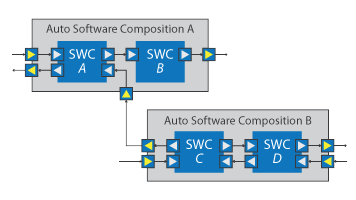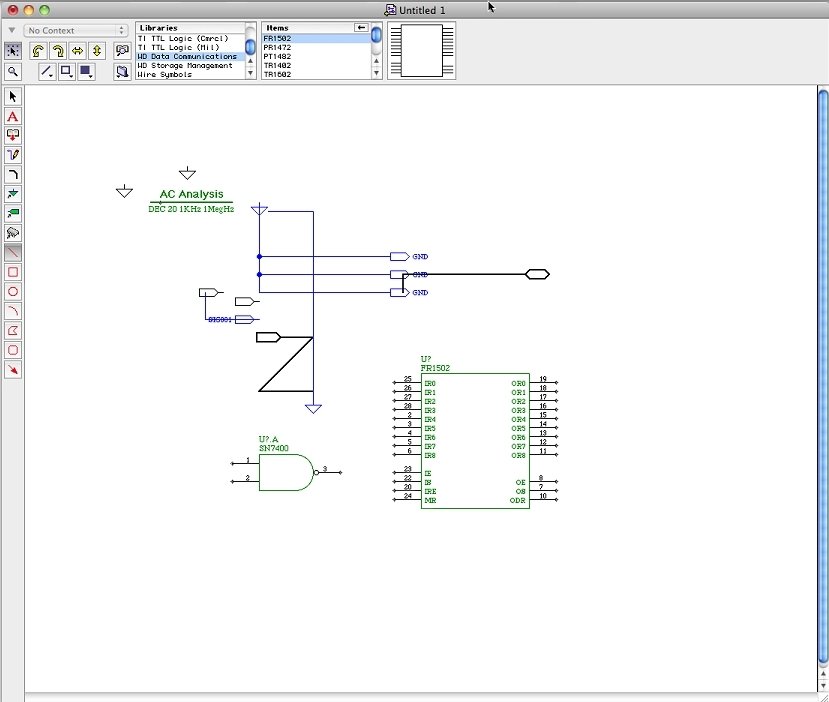McCAD PCB-ST Lite is the scholastic edition of the McCAD Pro Series. This FREE download is capable of doing small projects. It is an integrated PCB layout design environment for the board designer who does layout work and requires the availability of powerful design and edit tools at his fingertips. McCAD PCB-ST Lite is net list driven and suppo. Macintosh EDA Tools & Demos For 64Bit OSes. All of the software below either defaults to Lite or Demo mode until licensed. The Lite Mode allows you to use the software for small projects. These archives have been compressed to minimize download time. In the EDA Tool Settings pages of the Settings dialog box, you can specify options for the EDA tools you want to use. You can direct the Quartus ® Prime software to run a synthesis tool to synthesize the design as part of a normal compilation. You can also direct the Quartus ® Prime software to run a simulation or timing analysis tool automatically after compilation. Setting Options for EDA Tools In the EDA Tool Settings pages of the Settings dialog box, you can specify options for the EDA tools you want to use. You can direct the Quartus ® Prime software to run a synthesis tool to synthesize the design as part of a normal compilation.
tens of millions of FREE partS!
No subscription required, FREE is FREE.
The Footprint Expert Pro lets you automatically build footprints and use in your PCB design projects, for literally NO COST. The sky is the limit. Completely FREE with registeration / login.
To access save/retrieve/edit functions for part data and preferences (tolerances, line widths, pad shapes, etc.), get the Enterprise edition.
80% Discount for Enterprise Edition
Now you can get the full Enterprise edition license for 12 months - for only the cost of matintenance.
Download Footprint Expert Pro

Detailed Features
- IPC-7351 default settings
- Free training and technical support
- The full Enterprise Edition supports any of 25 CAD tool interfaces - Allegro, Altium Designer, Altium Nexus, Board Station, CADint, CADSTAR, CircuitStudio, CR5000, CR8000, Design Spark, DIP Trace, EAGLE, eCADSTAR, KiCad, McCAD, OrCAD Layout, OrCAD PCB, P-CAD, PADS, Pantheon, Proteus, Pulsonix, Solo PCB, TARGET 3001!, Ultiboard, Xpedition; most of these area also supported in the FREE Footprint Expert Pro
- The full Enterprise Edition supports 3D STEP model export directly from package dimensions - User control of Body, Lead and Polarity Color assignments, PTH Lead Length, Y & Z Vertical Axis, Least, Nominal and Maximum Material Condition, Low & High Quality, 180 different component families
- 44 major Surface Mount component families and 71 sub-families = 115 total families
- 26 major Through-hole component families and 39 sub-families = 65 total families
- Preference Options include:
- Terminal Settings for Pad Place Round-off, Solder and Paste Mask, Fabrication and Assembly Tolerances, 3 Density Levels, Courtyard to Body & Courtyard to Pad, Toe Heel and Side solder joint goals
- Rules for minimum Pad to Pad, Pad to Thermal, Minimum Solder mask Web, Gang Mask, Minimum Stand-off Pad Trimming, Rounded Rectangular Radius Settings, Thermal Pad Solder & Paste Mask
- Drafting rules for Silkscreen Legend, Assembly, Courtyard, Component and Terminal Lead Outlines, Reference Designators, Polarity Marking Automation and feature on/off buttons
- Settings for Units, Pin 1 Orientation, Origin Location, Pads on Assembly, Pad Shapes - Settings for Mfr. Recommended Footprint patterns
- Print Package and Footprint data to Printer or PDF
- Add 8 different Polarity Marking shapes for Silkscreen Legend and Assembly Top & Bottom layers
- Add Keep-outs for Top. Bottom or All Layers for Placement & Height, Trace, Copper, Via, Test Point and round, rectangle, square or map to courtyard shapes, any size and location
- Turn Layers on/off to display any layer to the top
- Footprint features for Panning, Zoom in & out, Mirror, Rotate
- Tools for PADS to CAD, Convert units, Pad Stack and Hole Size Calculator and Axial Lead Form Calculator
- Help includes 70 videos that describe every feature and a Check for Update feature
- Octopart Part Number Search engine for component availability and cost compare. Link to every vendor website for price quote and datasheet link
Footprint Expert Pro is the ultimate FREE footprint in the electronics industry, period! 3D STEP is also availble at a very low cost.
Truly a must-have tool for every PCB Designer, CAD Librarian and EE Engineer worldwide.
Published:
Topics: Edge AI, Open cloud systems, Open source tools
Renode is an open source simulation framework enabling effortless and collaborative software development of embedded and IoT devices in a deterministic environment. A wide toolbox of features for debug, trace and experimentation make it extremely useful in interactive code development scenarios, but the full potential of the tool is revealed in a Continuous Integration environment. With Antmicro’s help, a number of organizations are currently adopting Renode to radically improve their testing and CI situation for developing their products.
One such group is Google’s TensorFlow Lite for Microcontrollers team, which turned to Renode to run and reliably test machine learning models targeting microcontroller-based TinyML applications in a CI environment.
Accelerating TinyML development with Renode CI
Our collaboration with Google around TF Lite and Renode dates back to 2018 and, apart from our current wide-ranging rework of TF Lite Micro’s CI and enhancing its demo capabilities, has involved many joint projects, such as helping the to team create the initial TF Lite Micro port for RISC-V or running their popular ML library on a soft RISC-V CPU in a popular low-cost FPGA board, both on real hardware, virtually and in CI.
The current collaborative project between Google and Antmicro answers several needs that have emerged in the TF Lite for MCUs ecosystem with the increasing adoption of the framework.
The most challenging aspect of developing TinyML - as Google’s Pete Warden calls this field in the eponymous book - is the relative complexity of the development environment which typically involves physical boards spanning many computer architectures, with various input sensors running diverse minified ML models and a plethora of RTOS software.
This complex ecosystem calls for a novel, software-driven approach and a robust development flow, with advanced test, debug and trace capabilities as well as a high degree of observability and control over the development process. Most embedded CI flows are limited to checking if your code builds or not. Renode, on the other hand, offers a lot more extensive CI experience, enabling you to measure software metrics to detect anomalies early, monitor how your development is progressing and see how the software interacts with the platform it is being developed for. And whatever features are available in CI - determinism, custom sensor data input, detailed logging, state saving and loading, event hooks etc. - can also be used in an interactive environment to nail down specific problems in day-to-day development as well as for demonstration and education purposes.
Ensuring the fitness of TensorFlow Lite Micro

At an early stage of our CI-related work, Google’s TF Lite for MCU developers ran only synthetic tests in their Renode-based CI. These tests verify if the ML algorithms produce the expected results when fed with predefined data sets as input, which was already a huge improvement over relying on real HW testing, which does not scale so well.
This was not, however, all that Renode had to offer; the open source simulation framework supports complete platforms with complete I/O. And ML applications running on MCUs usually have to be provided with data from sensors: accelerometers, cameras, microphones and others. For a framework like TensorFlow Lite Micro, which aims to support a wide variety of hardware platforms, this means integrating with various third-party Hardware Abstraction Layers, with incompatible APIs and processing flows - which opens a large number of potential vectors for various hard-to-trace bugs.
In order to enable the full scope of TF Lite for MCU, on top of supporting typical inputs such as temperature, humidity sensors or accelerometers we worked with Google to add video and voice data input capability into Renode and implemented CI setups verifying real-life scenarios featuring sensors.
Our main focus was the very popular Arduino Nano 33 BLE Sense platform based on Nordic’s nrf52840, as well as a the FPGA-oriented LiteX SoC with VexRiscv CPU (implementing the RISC-V ISA), running TensorFlow Lite for MCU in Zephyr RTOS.
Such complex scenarios are virtually impossible to test regularly without proper automation, and Renode allows the TF Lite MCU team to ensure that each and every commit works as expected.

For the purpose of these tests we created dedicated repositories: one for Arduino and one for LiteX running Zephyr - which have become the prototype implementations for the TF Lite MCU continuous integrations using GitHub Actions as well as good, self-contained demo repositories in themselves.
McCAD EDA Tools Lite

To make the it compatible with the remaining part of TF Lite’s CI infrastructure, the results of the tests running in Renode are uploaded with our distant-bes-client library to Google’s Results Store back-end.
TinyML in 5 minutes
The wide-ranging CI work was only a starting point for further collaboration around making TinyML more widely available, understood and approachable. The above-mentioned repos, apart from serving our CI purposes, also contain a number of examples and demos, such as speech detection, person detection, and gesture recognition to give new users a quick and easy way to get started with TF Lite Micro. These interactive notebooks are runnable without installing any software, completely on Google’s Colab cloud servers, and give you a taste of how you can use virtual development for building TinyML applications without need for hardware thanks to Renode.
As another offshoot of the project, also aimed at bringing TinyML to a wider audience, we’ve also integrated our open source simulator with the Arduino IDE, which makes it possible to upload and run software on the Nano 33 BLE Sense directly from the IDE, while further work is being done to enable more interactive demos, visualization and other exciting features.
Platforms support and integrations
Renode supports multiple TinyML boards based on multiple ISAs, like the sensor-packed, Arm-based Nano 33 BLE Sense, the RISC-V Kendryte’s K210 or QuickLogic’s tiny QuickFeather FPGA SoC. Also, the TensorFlow repository includes Robot-based Renode tests for several other supported platforms, some of which have been supplied by external contributors, such as Arm. We are continuously working on adding support for more boards from vendors interested in widening the adoption of their hardware through Renode, so watch this space to find out when the platform you are eyeing becomes available in our open source development framework.
Much more than just CI
Mccad Eda Tools Lite Software
Renode’s wide ranging functionalities feature events recording, allowing the user to replay them to get the same, deterministic execution with user input; state saving, which can be used to save the state of the whole emulation into one file that can be shared with your team to solve problems collaboratively; as well as extensive and customizable logging capabilities, such as fine-tuned filtering depending on the log source and target, a built-in graphical log analyzer, and support of various data sources, e.g. executed software, peripherals analysis, framework events and user-defined events. Other options that are interesting in the TinyML development context include FPGA/hardware/software co-simulation as well as wired and wireless connection simulation. What’s not to love?
Mccad Eda Tools Lite Login
Whether you want your organization to adopt a Renode-based CI testing and development flow, or are interested in us developing support for your hardware in Renode, get in touch at contact@antmicro.com to discuss how our open source framework can help you achieve your goals.
